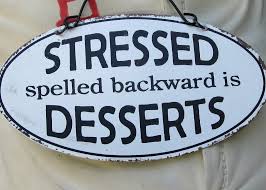Getting ready for the exams? How to handle stress

The other day I came across an article in Forbes talking about how successful people handle stress, and I thought to myself that this sounds like valuable knowledge for university students. The article was written by Travin Bradberry, who also has published a book called Emotional Intelligence 2.0. He frequently writes on the topics of emotional intelligence and leadership performance for Forbes.
The article on how successful people handle stress is based on research from Yale University, where the researchers got interesting insights. A person’s ability to cope with stress is closely related to the person’s self control, and the better a person manages to control themselves, the more likely they are to keep themselves out of stressful situations. This is why people tend to get stuck in progressive rounds of increasing stress, that eventually may lead to burnouts.
 A stressed person’s management of self-control is not only linked to stress. How a person manages emotions and maintains calm is also directly linked to that person’s performance. Stress is also a crucial emotion, because it makes it easier for the brain to take action, and the brain is more alert during periods where stress is experienced. Most successful people have implemented techniques in order to handle stress more effectively. Below I will summarize some of the strategies, and even though they may seem easy to utilize, a mind clouded with stress makes the utilization complicated. Anyway, these are important tips to be aware of, and I will definitely try to keep them in mind while studying for my finals. 1. Learn to say no Many people find it uncomfortable to say no, and inability to say no is seen related to increased levels of stress. Successful people manage to say no, which gives them the opportunity to success at all current tasks, without taking up too many commitments at the same time. 2. Avoid asking "what if?" Asking "what if?" makes you focus and spend time thinking of the possible outcomes, rather than focusing on the task at hand. Successful people focus on the action, and to remain calm, rather than focusing on potential outcomes that they cant control anyway. 3. Disconnect A person, who is available to work at all times, is also continuously exposed to stress. As technology has evolved, we have become more dependent on our devices, and it has made people feel like they have to stay available 24/7. By allowing yourself to take a break, by going offline or leaving your phone out of reach for a period of time, you can reduce mental stress. Many people, especially the younger generation, find it uncomfortable to stay offline. However, by staying offline during certain periods you will become more comfortable by doing so, and eventually the offline breaks can be a mental recharge in the weekly schedule. 4. Limit caffeine When you drink coffee your body releases adrenaline, which is the body's survival mechanism. This survival mechanism makes the brain focus on a fast response, instead of focusing on rational thinking. This causes a state of stress, as your emotions are actually overrunning your behavior. 5. Sleep Sleep is an important factor when it comes to one’s ability to manage stress and to increase emotional intelligence. For the brain, sleeping is like recharging. It basically either discards or stores memories, so you wake up clear headed. When a person doesn't get enough sleep, the memory, the self-control and the attention will be reduced. Also, sleep deprivation raises the levels of stress hormones. A good night of sleep should never be underestimated; a good night of sleep is often just what is needed to get things under control. 6. Exercise Exercising is one of the first priorities many people give up when exposed to stress. However, when you move the body releases an amino acid called Gamma-Amino Butyric acid, which basically acts as a neurotransmitter in the central nervous system. This helps you both to reduce stress and to stay in control of your emotions. Therefore, stress should never be a reason not to exercise, as it actually will make you feel better, and even lowers your stress levels.
A stressed person’s management of self-control is not only linked to stress. How a person manages emotions and maintains calm is also directly linked to that person’s performance. Stress is also a crucial emotion, because it makes it easier for the brain to take action, and the brain is more alert during periods where stress is experienced. Most successful people have implemented techniques in order to handle stress more effectively. Below I will summarize some of the strategies, and even though they may seem easy to utilize, a mind clouded with stress makes the utilization complicated. Anyway, these are important tips to be aware of, and I will definitely try to keep them in mind while studying for my finals. 1. Learn to say no Many people find it uncomfortable to say no, and inability to say no is seen related to increased levels of stress. Successful people manage to say no, which gives them the opportunity to success at all current tasks, without taking up too many commitments at the same time. 2. Avoid asking "what if?" Asking "what if?" makes you focus and spend time thinking of the possible outcomes, rather than focusing on the task at hand. Successful people focus on the action, and to remain calm, rather than focusing on potential outcomes that they cant control anyway. 3. Disconnect A person, who is available to work at all times, is also continuously exposed to stress. As technology has evolved, we have become more dependent on our devices, and it has made people feel like they have to stay available 24/7. By allowing yourself to take a break, by going offline or leaving your phone out of reach for a period of time, you can reduce mental stress. Many people, especially the younger generation, find it uncomfortable to stay offline. However, by staying offline during certain periods you will become more comfortable by doing so, and eventually the offline breaks can be a mental recharge in the weekly schedule. 4. Limit caffeine When you drink coffee your body releases adrenaline, which is the body's survival mechanism. This survival mechanism makes the brain focus on a fast response, instead of focusing on rational thinking. This causes a state of stress, as your emotions are actually overrunning your behavior. 5. Sleep Sleep is an important factor when it comes to one’s ability to manage stress and to increase emotional intelligence. For the brain, sleeping is like recharging. It basically either discards or stores memories, so you wake up clear headed. When a person doesn't get enough sleep, the memory, the self-control and the attention will be reduced. Also, sleep deprivation raises the levels of stress hormones. A good night of sleep should never be underestimated; a good night of sleep is often just what is needed to get things under control. 6. Exercise Exercising is one of the first priorities many people give up when exposed to stress. However, when you move the body releases an amino acid called Gamma-Amino Butyric acid, which basically acts as a neurotransmitter in the central nervous system. This helps you both to reduce stress and to stay in control of your emotions. Therefore, stress should never be a reason not to exercise, as it actually will make you feel better, and even lowers your stress levels. 7. Practice mindfulness Mindfulness is a simple form of meditation, that will help you to control your thoughts, and it has been proved that people who practice mindfulness are more focused, also when they are not meditating. Mindfulness does not necessarily require a lot of time; it is said that even sessions of 5-10 minutes will make a difference. It is supposed to help you to stop jumping between thoughts, which makes you sharper and increases the ability to stay focused. 8. Eliminate negative self-talk The human brain has a tendency to inflate things, and make them appear magnified. When you experience pessimistic or negative thoughts, you should stop doing what you are doing, and write down your thoughts. Take a moment, and you are likely to realize that the thoughts were not rational. When you have to express the thoughts outside the brain, it is easier to have a more clear-headed approach, and it is therefore easier to separate irrational thoughts from actual facts. If your thoughts, once you've written them down on a paper, still appear as a fact then you should take action. If it appears irrational you should get back to what you were doing, and you will realize that the irrational negative thought is far-gone.
7. Practice mindfulness Mindfulness is a simple form of meditation, that will help you to control your thoughts, and it has been proved that people who practice mindfulness are more focused, also when they are not meditating. Mindfulness does not necessarily require a lot of time; it is said that even sessions of 5-10 minutes will make a difference. It is supposed to help you to stop jumping between thoughts, which makes you sharper and increases the ability to stay focused. 8. Eliminate negative self-talk The human brain has a tendency to inflate things, and make them appear magnified. When you experience pessimistic or negative thoughts, you should stop doing what you are doing, and write down your thoughts. Take a moment, and you are likely to realize that the thoughts were not rational. When you have to express the thoughts outside the brain, it is easier to have a more clear-headed approach, and it is therefore easier to separate irrational thoughts from actual facts. If your thoughts, once you've written them down on a paper, still appear as a fact then you should take action. If it appears irrational you should get back to what you were doing, and you will realize that the irrational negative thought is far-gone.